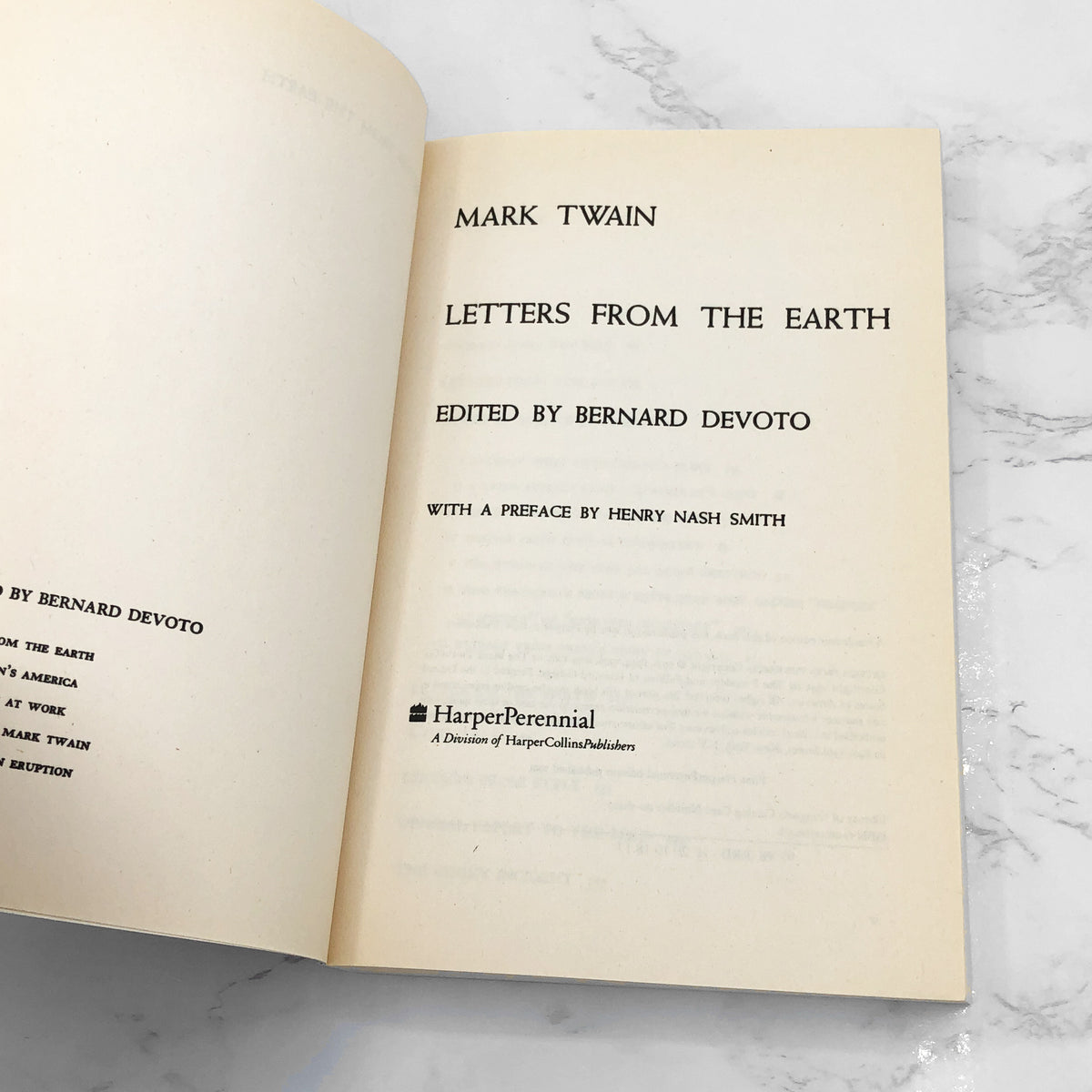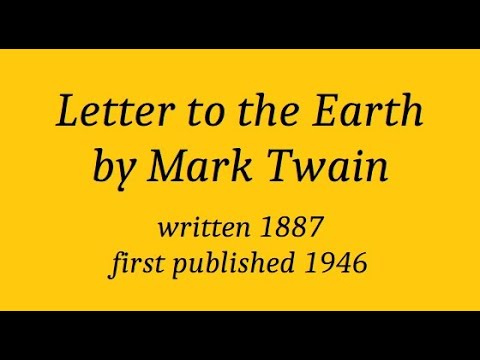Table of Contents
ToggleIntroduction
Letters From The Earth By Mark Twain Summary Letters from the Earth is a posthumously published work by Mark Twain, released in 1962, although Twain wrote it in the 1900s. This novella is an exploration of religion, humanity, and the absurdities of existence, presented through a series of letters written by Satan to the archangels in Heaven. Twain employs his characteristic wit and humor to critique organized religion, human behavior, and the nature of belief, making it one of his most provocative works.
Part 1: The Context of the Letters
The Narrative Frame
The novella is framed as a collection of letters written by Satan, who has been exiled from Heaven to Earth. These letters are directed to various archangels and serve as a commentary on the state of humanity and the nature of God. Twain’s use of Satan as the narrator allows for a unique perspective on divine and human affairs, blending satire with philosophical inquiry.
The Author’s Intent
Mark Twain’s intention in writing Letters from the Earth is to challenge conventional religious beliefs and expose the contradictions and absurdities present in organized religion. Through Satan’s observations, Twain critiques the moral and ethical frameworks that humans have created, encouraging readers to reflect on the nature of faith and the human condition.
Historical Context
Twain wrote Letters from the Earth during a time when religious dogma was being increasingly questioned, and the rise of rational thought and skepticism was becoming more prominent. This context informs Twain’s exploration of religion, morality, and human nature, making the novella a response to the changing cultural landscape of his time.
READ MORE
Part 2: The Letters
Letter 1: Introduction to Earth and Humanity
In the first letter, Satan expresses his astonishment at the state of Earth and its inhabitants. He describes humans as a peculiar species, created in God’s image yet filled with flaws, contradictions, and absurdities. Satan’s observations reflect Twain’s critical view of humanity, highlighting the irony of humans’ belief in their superiority despite their moral failings.
Letter 2: The Creation of Humanity
Satan discusses the creation of humans and the story of Adam and Eve. He reflects on the implications of their disobedience and the subsequent punishment inflicted upon them. Twain uses this narrative to question the justice of God’s actions and the notion of original sin, presenting a perspective that challenges traditional interpretations of these biblical events.
Letter 3: The Nature of God
In this letter, Satan critiques the nature of God as depicted in religious texts. He questions God’s omnipotence, benevolence, and omniscience, arguing that the existence of evil and suffering in the world contradicts the idea of a loving and just deity. This exploration of God’s character serves as a vehicle for Twain’s broader commentary on the nature of faith and belief.
Letter 4: The Absurdities of Religion
Satan explores the absurdities inherent in religious practices and beliefs. He observes the rituals, dogmas, and contradictions that define organized religion, highlighting the hypocrisy of religious leaders and institutions. Twain’s satirical tone emphasizes the disconnect between religious teachings and human behavior, provoking readers to question the validity of these practices.
Letter 5: Humanity’s Relationship with God
In this letter, Satan reflects on humanity’s relationship with God, portraying it as one filled with fear, misunderstanding, and subservience. He argues that humans are conditioned to view God as a tyrant, leading to a distorted understanding of faith. This critique highlights the complexities of belief and the ways in which religion can be used as a tool for control.
Letter 6: The Nature of Morality
Satan delves into the concept of morality and its origins. He questions the validity of moral absolutes and suggests that human morality is a construct shaped by societal norms rather than divine decree. This exploration of morality challenges readers to consider the nature of right and wrong and the factors that influence their ethical beliefs.
Letter 7: The Human Condition
In this letter, Satan reflects on the human condition, emphasizing the struggles, suffering, and absurdities of life. He portrays humans as beings caught in a futile search for meaning, often driven by fear and desire. Twain’s observations reveal a deep empathy for humanity, even as he critiques its failings.
Letter 8: The Role of Suffering
Satan addresses the role of suffering in the human experience, questioning its purpose and the way it is often glorified in religious teachings. He challenges the notion that suffering is inherently virtuous, arguing that it is an unfortunate aspect of existence that should not be romanticized. This perspective invites readers to confront their own beliefs about suffering and its place in life.

Part 3: The Philosophical Inquiry
The Nature of Faith
Throughout the letters, Twain examines the nature of faith and belief. Satan’s reflections prompt readers to consider the origins of their beliefs and the ways in which they are shaped by culture, tradition, and personal experience. Twain suggests that faith should be a personal journey rather than a dogmatic adherence to established norms.
The Absurdity of Existence
Satan’s letters convey a sense of absurdity regarding human existence. Twain highlights the contradictions and irrationalities that define the human experience, encouraging readers to embrace the chaos of life rather than seek rigid answers. This perspective resonates with existential philosophy, inviting introspection and self-examination.
The Search for Meaning
A recurring theme in the letters is the search for meaning in a seemingly indifferent universe. Twain portrays humans as beings striving for significance amid chaos and uncertainty. Satan’s observations underscore the futility of seeking absolute answers, encouraging readers to find their own meaning in life.
Part 4: The Conclusion
Satan’s Final Thoughts
In the final letters, Satan summarizes his observations and reflections on humanity, faith, and the nature of existence. He acknowledges the inherent contradictions and absurdities of life while expressing a certain admiration for humanity’s resilience and capacity for love. This nuanced perspective offers a glimmer of hope amid the critique, suggesting that despite their flaws, humans possess the potential for goodness and understanding.
Twain’s Legacy
Letters from the Earth stands as a testament to Twain’s enduring legacy as a social critic and philosopher. His exploration of religion and human nature remains relevant, inviting readers to engage with the complexities of belief and existence. The novella challenges conventional wisdom and encourages a deeper understanding of the human experience.
The Impact of Letters from the Earth
Since its publication, Letters from the Earth has sparked discussions about faith, morality, and the human condition. Twain’s provocative insights continue to resonate with readers, inspiring critical reflection on the nature of belief and the absurdities of life.
Themes and Analysis
1. Critique of Organized Religion
Twain’s sharp critique of organized religion serves as a central theme throughout the novella. By portraying Satan as a thoughtful observer, Twain exposes the contradictions and absurdities inherent in religious beliefs and practices, encouraging readers to question their own faith.
2. The Nature of God and Morality
The exploration of God’s character and the origins of morality prompts readers to reflect on their understanding of divine justice and ethical behavior. Twain challenges the idea of absolute morality, suggesting that human values are shaped by culture and experience.
3. Absurdity and Existentialism
The absurdity of human existence is a recurring theme in Letters from the Earth. Twain’s portrayal of life as filled with contradictions and irrationalities aligns with existential philosophy, inviting readers to confront the chaos of life without seeking rigid answers.
4. The Search for Meaning
The search for meaning amid chaos is a fundamental aspect of the human experience. Twain’s exploration of this theme encourages introspection and self-examination, highlighting the importance of personal belief systems and the quest for understanding.
5. Humanity’s Resilience
Despite the critiques and existential reflections, Twain expresses a sense of admiration for humanity’s resilience and capacity for love. This nuanced perspective acknowledges the complexities of the human condition, suggesting that even in a flawed existence, there is potential for goodness.

Conclusion
Letters from the Earth is a profound exploration of religion, morality, and the human condition, presented through the unique lens of Satan as a thoughtful observer. Mark Twain’s sharp wit and critical insights challenge readers to reflect on their beliefs and the absurdities of existence. The novella remains a significant contribution to American literature and philosophical discourse, inviting ongoing contemplation of faith, meaning, and the complexities of life.
(FAQs)
1. What is the main theme of Letters from the Earth?
The main theme of Letters from the Earth revolves around the critique of organized religion, the nature of God, and the absurdities of human existence. Twain uses Satan’s letters to challenge conventional beliefs and encourage readers to reflect on their understanding of faith and morality.
2. Who is the narrator of the novella?
The narrator of Letters from the Earth is Satan, who writes letters to various archangels. This unique perspective allows Twain to critique religious beliefs and human behavior through the eyes of a character traditionally viewed as the embodiment of evil.
3. How does Twain portray God in the novella?
Twain portrays God as a complex and often contradictory figure. Through Satan’s observations, he questions God’s benevolence, justice, and omniscience, suggesting that the existence of evil and suffering challenges traditional views of a loving deity.
4. What is Twain’s view on morality?
Twain challenges the idea of absolute morality in Letters from the Earth. He suggests that moral values are constructs shaped by societal norms rather than divine decree, prompting readers to reconsider their understanding of right and wrong.
5. How does the novella address the concept of free will?
The novella explores the concept of free will by suggesting that human actions are often predetermined by external factors, including culture and environment. Twain encourages readers to reflect on the complexities of choice and responsibility in their lives.
6. What impact has Letters from the Earth had on literature and philosophy?
Letters from the Earth has influenced discussions about faith, morality, and the human condition. Twain’s provocative insights continue to resonate with readers, inspiring critical reflection on the nature of belief and the absurdities of life.
7. How does Twain’s writing style contribute to the novella?
Twain’s writing style is characterized by wit, irony, and philosophical depth. His conversational tone and use of humor in Satan’s letters invite readers to engage with the ideas presented, making complex themes accessible and thought-provoking.
8. What is the significance of the title Letters from the Earth?
The title reflects Satan’s role as an observer of humanity and the Earth. It underscores the contrast between divine perspectives and human experiences, highlighting the absurdities and contradictions inherent in life and belief.
READ MORE
















